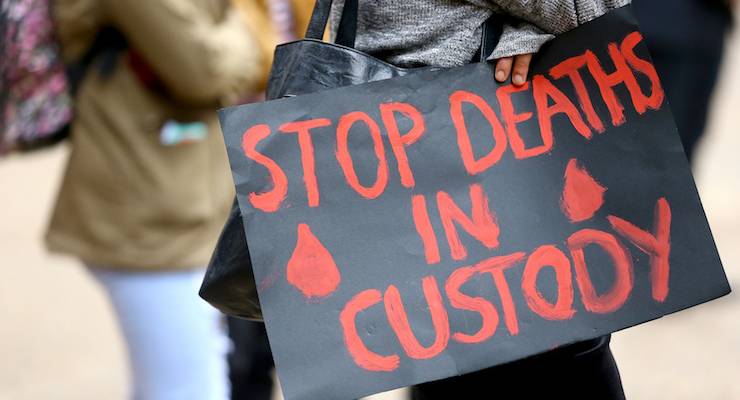
It’s been a month since the Northern Territory became the last state or territory in Australia to ensure that police contact an Aboriginal and Torres Strait Islander legal service (ATSILS) whenever they arrest an Indigenous person. Surprisingly, not one of the three NT agencies instrumental in running the service — NT Police, the NT government or the North Australian Aboriginal Justice Agency (NAAJA) — has said anything public about it.
That’s odd.
On the face of it, a new custody notification service (CNS) is good news — for the Michael Gunner’s Labor government, for which the CNS was an election promise; for the police, whose members don’t want to be held responsible for preventable deaths; and for NAAJA and especially its clients. CNS notifications have been seen as one of the most effective means of preventing Aboriginal deaths in police custody since they were recommended by the royal commission which inquired into the reasons behind such deaths in 1991. Since then, all states and the ACT have adopted a CNS — either through legislation, agreements between an ATSILS and police, changes to police policy, or a combination.
But until June 11, all NT police had to do after arresting someone was to tell them they had a right to silence and to a “friend”. Police did not need to tell a person they had a right to a lawyer. Police only had to contact a lawyer if an arrested person asked to speak to one. In most cases, there was no such request.
The fact that this has changed is vitally important to the welfare of Aboriginal Territorians, who are subject to intensive state surveillance and frequent arrest. All three agencies have worked hard to make the CNS a reality over the past three years, and longer. When former Aboriginal affairs minister Nigel Scullion announced the $2.25 million in federal funding for the CNS last November, NAAJA’s CEO, Priscilla Atkins, proudly joined him. The prime minister’s department publicly confirmed the funding arrangements in May. The CNS is no secret. So why the collective silence?
It could be that NAAJA, NT Police and the Gunner government are waiting for the passage of a statutory amendment — which would make the CNS law — before making the formal announcement. However, nobody has explained why the amendment’s passage has been delayed. It’s been drafted, and police minister Nicole Manison could ask administrator Vicki O’Halloran to formally make it law at any time; she doesn’t need to wait for parliament to return from its mid-year break in August.
Until then, the CNS is governed by an essentially voluntary agreement between police and NAAJA. It could be that they’re delaying any announcement until they iron out some of the system’s kinks. And there are a few, apparently. Scullion’s funding wasn’t enough to roster more than one NAAJA staff member at a time to take CNS calls, for instance. The sheer rate at which Aboriginal people are arrested in the Territory — a rate known to police and presumably to NAAJA, but not routinely published — has occasionally overwhelmed the system.
Scullion’s funding was also, it seems, not quite enough to ensure, as in New South Wales, that every staff member employed onto the on-call CNS roster by NAAJA is a lawyer. Non-lawyers who take custody calls can’t lawfully provide legal advice.
Significantly, neither the agreement nor the draft amendment require police to contact NAAJA after taking a person into “protective custody” when they’re too intoxicated to care for themselves, despite the heightened risk of them dying in custody. Sources suggest NAAJA is waiting to collate data from the first three to six months of CNS operations so that it might pitch for additional funding. It would be useful to have these aspects clarified publicly.
Unfortunately, Territorians haven’t been privy to much information at all in relation to recent justice reforms. In November, a year after the Royal Commission into the Protection and Detention of Children called for tear gas to be banned inside youth detention centres, it was deployed against teenagers at Don Dale. CCTV footage was leaked to the ABC, but no explanation has yet been forthcoming and NAAJA hasn’t said anything at all.
When an operational directive last year authorised armed police officers to again be stationed inside high schools (typically those with the highest proportions of Aboriginal students), neither the police minister nor police explained why, and NAAJA raised no concerns publicly. And there’s still been no public explanation for the government’s failure to replace Don Dale or its Alice Springs equivalent. Again, NAAJA has refrained from public criticism.
The Gunner government, which promised “open government”, and NAAJA, whose client base and affected communities deserve to know how their rights are being affected, have responsibilities and indeed interests in promoting a broad understanding of recent changes. There may be good reasons for the collective silence on these and other matters… but it’s difficult to imagine what they are.
Russell Marks is an honorary associate at La Trobe University, and worked as a criminal defence lawyer for NAAJA until April this year. This piece does not represent the views of NAAJA and none of the information informing this piece came from his employment at the organisation.







Nigel Scullion failed Aboriginal Australia. Under his ministership, things went backwards. Why was there money for white cattle station owners and white amateur and professional fishermen to help them fight native title (funding meant to help Aboriginal disadvantage), but no money for this important reform? Funded to fail?
Will Wyatt work for his people or will he continue with the agenda of the IPA?